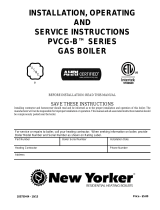6 Rinnai I-Series Condensing Boiler Solo Manual
WARNING
This product can expose you to
chemicals including lead, lead
compounds and carbon disulde which
are known to the State of California to
cause cancer, birth defects or other
reproducve harm. For more
informaon, visit
www.P65Warnings.ca.gov.
• Flammable liquids such as cleaning
solvents, aerosols, paint thinners,
adhesives, gasoline and propane must be
handled and stored with extreme care.
These ammable liquids emit ammable
vapors and when exposed to an ignion
source can result in a re hazard or
explosion. Flammable liquids should not be
used or stored in the vicinity of this or any
other gas appliance.
• DO NOT operate the boiler without the
front panel installed. The front panel
should only be removed for service/
maintenance or replacing internal
components.
• BURN HAZARD. Hot exhaust and vent may
cause serious burns. Keep away from the
boiler. Keep small children and animals
away from the boiler.
• Heang supply and return pipes leaving
the boiler can be hot to touch.
• Install the vent system per local and
naonal codes.
• Do not install this boiler above 10,200
(3,109 m).
• Do not obstruct combuson air to the
boiler.
• Rinnai recommends that every home have
a carbon monoxide (CO) alarm in the
hallway near bedrooms in each sleeping
area. Check baeries monthly and replace
them annually.
• California law requires the following
Proposion 65 warning to be provided:
• Do not use this appliance if any part has
been under water. Immediately call a
licensed professional to inspect the
appliance and replace any part of the
control system and any manual gas control
valve which has been under water.
• Do not use substute materials. Use only
parts cered for the appliance.
• Should overheang occur or the gas
supply fail to shut o, turn o the manual
gas control valve to the appliance.
• It is strongly recommended that you use a
trained and qualied professional who has
aended a Rinnai installaon training class
to adjust parameter sengs.
• Do not use an extension cord or adapter
plug with this appliance.
• Any alteraon to the appliance or its
controls can be dangerous and will void
the warranty.
• To protect yourself from harm, before
performing maintenance:
− Turn o the electrical power supply by
unplugging the power cord or by
turning o the electricity at the circuit
breaker. (The boiler controller does
not control the electrical power.)
− Turn o the gas at the gas control,
usually located immediately below the
boiler.
− Turn o the incoming water supply.
Turning o the water for the central
heang system is done at the boiler
system lling staon shut-o valve or
the main water supply to the building.
− Use only your hand to turn the manual
gas control valve. Never use tools. If
the manual gas control valve will not
turn by hand, do not try to repair it;
call a trained and qualied
professional. Force or aempted
repair may result in a re or explosion.
• Proper venng is required for the safe
operaon of this appliance. Failure to
properly vent this appliance can result in
death, personal injury and/or property
damage.





















